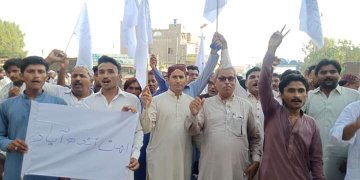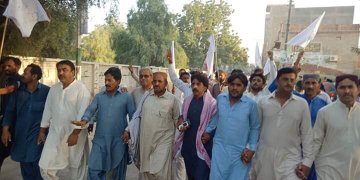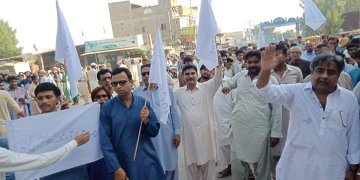Pakistani police have detained a Hindu school principal in the southern town of Ghotki, after he was accused of committing blasphemy by a student, prompting riots by far-right protesters, police officials and Hindu community leaders say.
Notan Lal, the owner and principal of a private school in Ghotki, located about 425km north of Karachi, Pakistan's largest city, was taken into "protective custody" on Sunday, senior police official Farrukh Lanjar told Al Jazeera.
"He is in protective custody and we are inquiring about what his role is [in the incident]," said Lanjar. "The student has also been questioned. The inquiry is under process."
Blasphemy is a sensitive subject in
Pakistan, where at least 75 people have been killed since 1990 in connection with allegations of the crime, according to an Al Jazeera tally.
The crime, which includes insulting the Quran (Islam's holy book), attacking religious sites or insulting Prophet Muhammad, can carry a mandatory death penalty.
At least 40 people are serving life sentences or are on death row for blasphemy in Pakistan, according to the United States Commission for International Religious Freedom (
USCIRF).
On Sunday, an angry mob ransacked the school where the incident allegedly took place and attacked a Hindu temple, badly damaging its interior, members of the Hindu community told Al Jazeera.
"In the temple, they broke the windows, and the things inside, including our idols, were also damaged," said Mukhi Kika Ram, the leader of the local Hindu community.
Ram said several shops and homes were also damaged by rioters.
'Tempers high'
Police said they intervened on Sunday with a heavy deployment of personnel to bring the town back in order, and registered a blasphemy case for the attack on the temple.
"We ensured that minorities be protected and their places of worship and homes be protected," said Lanjar. "We have deployed additional personnel there."
Later on Sunday, government officials held talks with the religious leaders leading the protests to end the violence, said provincial Information Minister
Saeed Ghani.
"We are investigating and going through every person possibly involved, but tempers are high and people are charged and we want to make sure the situation is calm before we proceed ahead and verify details," said Jamil Ahmad, a senior police official, adding that Lal's statement had been recorded.
On Sunday night, Ahmad said Muslim religious leaders spent the night with Hindu representatives of the area at the temple that was attacked as a show of solidarity.
"The community around the school and temple has shown great maturity. Clerics of every sect showed up in solidarity at the temple. And the Muslim community and clerics provided security to Hindu families."
Blasphemy case
The accusation against Lal centres on comments he allegedly made while sitting in on an Urdu lesson, said Abdul Aziz Khan, the complainant in the case.
Khan's son, 15-year-old Muhammad Ibtisam, alleges that Lal insulted the prophet during a lesson on his life and travel between two holy cities.
Khan alleged that Lal had later sent school staff to their residence to pressure Ibtisam to recant his statement, resulting in a violent altercation between Khan's family and the staff.
"We had a confrontation there, where we argued with them over this," he said, adding that following the violence he registered the blasphemy case at the local police station.
On Sunday, local religious parties, including the Sunni Tehreek and the Jamiat Ulema Islam, led protests in Ghotki, forcing businesses to shut and resulting in the attacks on the temple and school, residents told Al Jazeera. Videos from the protests showed Muslim leaders called for "blasphemers" to be put to death.
Khan, himself under police protective custody, condemned the violence, saying Lal should only face any punishment under the law.
"Whoever has done this, it is completely wrong," he said. "Our religion does not give permission for this. Our Prophet Muhammad, on whose name we are pursuing this case, says for no one to ever be harmed, even if they are non-Muslim.
"If one heretic has committed heresy, then the police must arrest him, the court must hear him and then he will face his punishment."
Hindus fear for their safety
Pakistan human rights body called the mob violence against the minority community "barbaric" while Amnesty International said the perpetrators of the attack must be held "
accountable".
"The authorities must take prompt action to quell the violence and ensure the safety of the school principal being targeted,"
said the independent Human Rights Commission of Pakistan in a
Twitter post following the violence.
"The video circulated earlier is chilling: mob violence against a member of a religious minority is barbaric, unacceptable."
Hindu community leaders, however, said they continued to fear for their safety in Ghotki.
"We are very hurt by the idea that if one person commits a mistake, then the whole Hindu community is punished for it," said Jewat Ram Manglani, a community leader. "We respect both our temples and also mosques, and people should also respect us."
Pakistan is home to roughly 3.3 million Hindus, a small minority in a country of 207 million people. The majority of the country's Hindus live in the southern province of Sindh, where Ghotki is
located.


